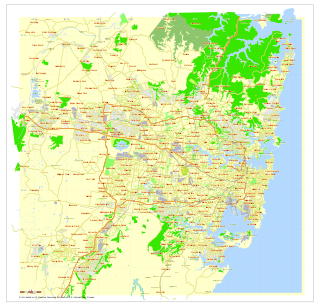
Charters Towers is a town in northern Queensland, Australia. It is 134 kilometres (83 mi) inland (south-west) from Townsville on the Flinders Highway. In 2016 the population was 8,120 people. During the last quarter of the 19th century the town boomed as the rich gold deposits under the city were developed. After becoming uneconomic in the 20th century, profitable mining operations have commenced once again.

Ravenswood is a small mining town and locality in the Charters Towers Region, Queensland, Australia. It is approximately 40 kilometres (25 mi) south of Mingela, and about 89 kilometres (55 mi) from Charters Towers. In the 2011 census, Ravenswood had a population of 349 people.

Bowen Courthouse is a heritage-listed courthouse at 30 Williams Street, Bowen, Whitsunday Region, Queensland, Australia. It was designed by George St Paul Connolly of the Colonial Architect's Office and built in 1880 by Southall & Tracey. It is also known as Bowen Court House. It was added to the Queensland Heritage Register on 21 October 1992.
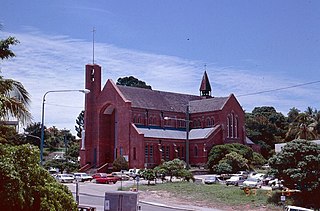
St James Cathedral is a heritage-listed cathedral of the Anglican Diocese of North Queensland at 36 Cleveland Terrace, Townsville, City of Townsville, Queensland, Australia. It was designed by Arthur Blacket and was built in 1887 by MacMahon & Cliffe. It was added to the Queensland Heritage Register on 21 October 1992.

Charters Towers is a railway station on the Great Northern line at Charters Towers, 134 kilometres (83 mi) west of Townsville in North Queensland, Australia.
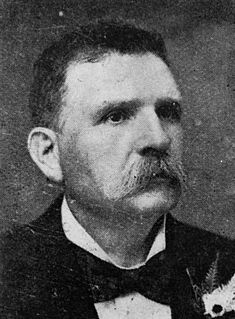
Edward David Miles was a businessman, and member of the Queensland Legislative Council.

Cahill's Stores is a heritage-listed commercial building at 232 - 234 Quay Street, Rockhampton, Rockhampton Region, Queensland, Australia. It was designed by John William Wilson and built in 1889. It is also known as Central Queensland Livestock Co-operative Society, Clarke's Building, Flamingos Nightclub, Stadium Nightclub, Dalgety & Co., WG Murray Ltd, Inglis Ltd, and Kerrisk Bros. It was added to the Queensland Heritage Register on 21 October 1992.

Selhurst is a heritage-listed detached house at 24 Cleveland Terrace, North Ward, City of Townsville, Queensland, Australia. It was built in 1919. It was added to the Queensland Heritage Register on 30 May 2003.

Bank of New South Wales Building is a former heritage-listed bank at 101-111 Flinders Street, Townsville CBD, City of Townsville, Queensland, Australia. It was built in 1887 by Denis Kelleher. It is also known as Australian Meat Industry Employees Union. It was added to the Queensland Heritage Register on 21 October 1992.
W G Smith & Sons was an architecture firm headquartered in Townsville, Queensland, Australia. Some of their works are heritage-listed.
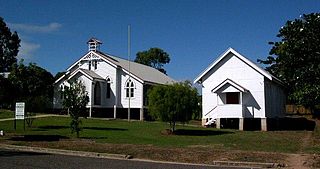
St John's Anglican Church Precinct is a heritage-listed churchyard at 30-34 Macrossan Street, South Townsville, City of Townsville, Queensland, Australia. It was built from c. 1907 to c. 1911. It was added to the Queensland Heritage Register on 21 October 1992.

Commonwealth Bank Building is a heritage-listed former bank building at 272-278 Flinders Street, Townsville CBD, City of Townsville, Queensland, Australia. It was designed by John and Herwald Kirkpatrick and built in 1923 by Charles Hanson & Sons. It is also known as Commonwealth Savings Bank and Townsville City Council Library. It was added to the Queensland Heritage Register on 29 October 2004.
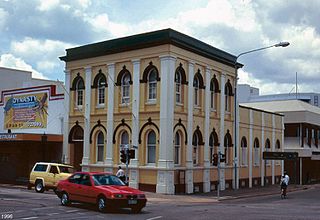
Aplin Brown & Company Building is a heritage-listed commercial building at 232-234 Flinders Street, Townsville CBD, City of Townsville, Queensland, Australia. It was built in 1887 by Rooney Brothers. It is also known as Buckaroo's Restaurant, Family Services, and Toula's Taverna. It was added to the Queensland Heritage Register on 21 October 1992.

The Dalgety Offices is a heritage-listed office building at 1-13 Sturt Street, Townsville CBD, City of Townsville, Queensland, Australia. It was designed by Walter Hunt and built from 1923 to 1925 by William Hornby Turner. It is also known as Sunskill House. It was added to the Queensland Heritage Register on 26 August 2005.

Mulgrave Shire Council Chambers is a heritage-listed former town hall at 51 The Esplanade, Cairns, Cairns Region, Queensland, Australia. It was designed by Charles Dalton Lynch & Walter Hunt and built from 1912 to 1913 by Wilson & Baillie. It is also known as Cairns Shire Offices. It was added to the Queensland Heritage Register on 6 January 1999.
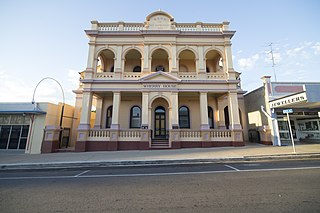
Bank of New South Wales is a heritage-listed former bank building at 34-36 Gill Street, Charters Towers, Charters Towers Region, Queensland, Australia. It was designed by Eyre & Munro and built in 1889 by Kelleher. It is also known as Wherry House. It was added to the Queensland Heritage Register on 9 November 2012.

Charters Towers City is the central suburb of the town of Charters Towers in the Charters Towers Region, Queensland, Australia.
William Henry Allan Munro (1856–1913) was an architect in Queensland, Australia. Some of his works are now heritage-listed.




